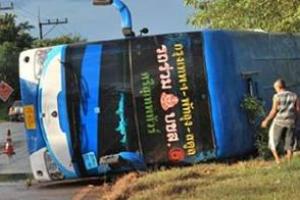Thailand Accident Research Center
ศูนย์วิจัยอุบัติเหตุแห่งประเทศไทย
Research
Songkran exodus will again bring misery
Shocking results have been revealed in a joint research study conducted by the Thailand Accident Research Center (TARC) at the Asian Institute of Technology (AIT) and Thai Roads Foundation last year in 2012. The study which was partly funded by the Thai Health Promotion Foundation found that – at least 53% of the vans and at least 67% of the buses drive over the speed limit on the highways and motorways in Thailand. Speed survey of buses and vans were done quarterly in 2012 on four major national highways (Highway 1, 34, 35 and 338) and on one motorway (Motorway Highway 7).
| Van on Fixed Route | Van on Non-Fixed Route | Bus on Fixed Route | Bus on Non-Fixed Route | |
|---|---|---|---|---|
| % Speeding | 55% | 53% | 67% | 81% |
Speeding or driving over the speed limit results in higher risk of road crash and also more severe accidents. As the speed of the vehicle increases the driver tends to have less control over the vehicle and the chances of taking evasive action by the driver increases as well. This greatly increases the risk of a road accident. The impact of collision that a vehicle travelling at a higher speed incurs is much higher than the impact of collision that a vehicle travelling at a lower speed incurs; the severity of injury greatly increases as the impact of collision increases. This is why speeding results in more severe accidents.
The current trend of speeding by bus and van drivers is a serious threat to public safety on the road, especially as the Songkran Holidays are approaching because public transport is the common mode of transport for intercity travel in Thailand and 87% of the people who use public transport use either the buses or the vans running on fixed and non-fixed routes.
Road accidents are considered as the primary causes of death in Thailand and speeding have been identified as a key contributing factor for the road accidents in the country. What is more concerning is that road accidents in Thailand are most evident during the Songkran holiday season and the New Year holiday celebrations. The Emergency Medical Institute of Thailand (EMIT) states that the total number of people who died and got injured due to road traffic crashes in the Songkran holidays last year in 2012 just in a span of seven days (between 11 April 2012 and 17 April 2012) was 27,881.
If the current trend of speeding by the buses and vans continues then traveling on the buses and vans may not be considered safe during the coming Songkran holidays. Since road transport is the only major way of getting to most places in Thailand, people will have no other way but to use the unsafe buses and vans to travel in the country risking their lives. Though, it is important to mention that besides speeding, there are some other reasons why travelling on some of these vans and buses maybe unsafe.
Vans – To avoid frequent stops to the gas station, many of the vans have added extra gas cylinders inside the van. When fully loaded with passengers and gas, these vans reaches a weight of about 3500 kgs, which is 1.75 times more than the allowed weight limit of 2000 kgs. The extra weight makes the vans highly unstable and unsafe which increases the chance of an accident.
Double-decker buses – Double-decker buses are used as tour buses and also in the fixed routes. Investigators in many of the accidents caused by the double-decker buses have found that these buses which should have a maximum height of 3.5 meter are at times up to 5 meter high. The extra height weakens the superstructure of the bus, making the bus unstable and prone to roll-over which is why roll-over accidents of double-decker buses in Thailand is quite common. To prevent such types of accidents, Thailand has been planning to implement the UNECE Regulation No. R66 which will make it mandatory for buses to go through a test of ‘Strength of Superstructure’.
Road accidents have a negative socio-economic impact on the victim, victim’s family and mostly on the national economy. It may even push people into poverty. Tourism plays a pivotal role in the Thai economy but the unsafe road transport may drive away tourists hampering the Thai economy. Concerned stakeholders must take action now to reduce the amount of road accidents. Since there are only a few days left before the Songkran holiday, nothing drastic can be done such as weighing all the vans or testing the strength of all the double-decker buses but some preventive measures can still be taken to at least minimize some of the road traffic accidents during this coming holiday season such as strictly enforcing the speed limit and other traffic laws and campaigning against drunk driving to ensure that Thai’s as well as foreigners are able to reach their destination safe and sound and enjoy the water festival with joy and happiness. Passengers should also take part by encouraging drivers to follow the traffic rules.


